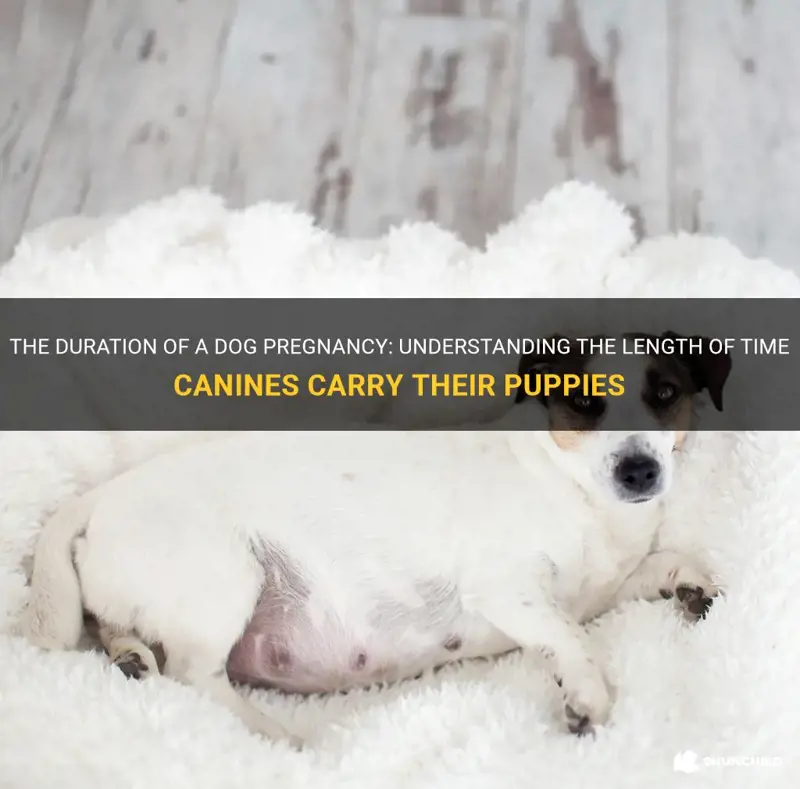
Did you know that dogs have relatively short pregnancy periods compared to many other animals? A dog's pregnancy, known as gestation, typically lasts around 63 days from the moment of conception. This period is shorter than the average human pregnancy, making it an intriguing topic to explore. So grab your metaphorical doggy bag and let's delve into the fascinating world of canine reproduction!
What You'll Learn

How long is the average duration of a dog's pregnancy?
The average duration of a dog's pregnancy, also known as the gestation period, can vary depending on the breed; however, on average, it lasts about 63 days. It is important to note that this is merely an estimate and there can be some variation. Understanding the duration of a dog's pregnancy is crucial for dog owners and breeders, as it helps them prepare for the arrival of the puppies and ensure the mother's well-being throughout the pregnancy.
During the first few weeks of pregnancy, it can be difficult to detect any visual signs of pregnancy in a dog. However, an experienced veterinarian or breeder can perform a pregnancy test around the 25th day after mating. This test can be done through a blood sample or an ultrasound. It is important to confirm the pregnancy early on to monitor the health of the mother and provide proper care.
As the pregnancy progresses, physical changes in the mother become more apparent. Around the 30th day, the dog's nipples may become swollen and pinker in color. This is due to increased blood flow to the mammary glands in preparation for milk production. Additionally, the dog's abdomen may start to expand as the puppies grow. It is important to note that these physical changes may vary from dog to dog, and some dogs may not show any noticeable signs until later in the pregnancy.
During the final few weeks of pregnancy, it is crucial to provide the mother with a comfortable and safe area to give birth. This can be achieved by setting up a whelping box, which is a designated space where the puppies will be born and kept until they are old enough to be weaned. The whelping box should be large enough to accommodate the mother and her puppies comfortably, and it should have low sides to allow easy access for the mother to enter and exit.
Around day 58 to 63, the mother dog will go into labor and give birth to her puppies. The labor process can vary in duration and intensity, but it typically consists of three stages: early labor, active labor, and delivery. The mother may exhibit signs of restlessness, pacing, panting, and nesting behavior before the onset of labor. It is important to monitor the progress of labor and contact a veterinarian if any concerns or complications arise.
During the delivery stage, the mother will work to push out each puppy, and it is essential to provide assistance if needed. The puppies are born enclosed in a protective sac, which the mother will typically tear open and remove. However, if the mother is unable to do so, it is necessary to step in and help. This can be done by gently tearing open the sac and clearing the puppy's air passage. It is crucial to handle the puppies with care and ensure their safety and well-being during this crucial time.
After all the puppies have been born, it is essential to provide proper postnatal care for both the mother and the newborns. This includes ensuring the mother has a clean and comfortable area to nurse her puppies, providing a balanced diet to meet her increased nutritional needs, and monitoring the puppies for any signs of distress or health concerns. Regular veterinary check-ups are recommended to ensure the health and well-being of both the mother and her puppies.
In conclusion, the average duration of a dog's pregnancy is about 63 days. Understanding the various stages of pregnancy and the necessary care during this time is crucial for both dog owners and breeders. By providing proper care and monitoring, we can ensure the health and well-being of the mother dog and her puppies throughout the pregnancy and beyond.
The Income Potential for OBGYNs with Pregnancy Patients Revealed
You may want to see also

Can the length of a dog's pregnancy vary depending on the breed?
Yes, the length of a dog's pregnancy can vary depending on the breed. While the average gestation period for most dogs is around 63 days, there can be significant variations among different breeds. Factors such as breed size, genetics, and individual differences can influence the duration of a dog's pregnancy.
The gestation period for dogs can range from as short as 58 days to as long as 68 days. Smaller breeds tend to have shorter gestation periods, while larger breeds may have slightly longer ones. This is believed to be due to the different growth rates and metabolic rates of different breeds. For example, Chihuahuas and Toy Poodles are known for having shorter gestation periods, often around 60 days, while St. Bernards and Great Danes may have pregnancies that last closer to 65 days.
Genetics also play a role in the length of a dog's pregnancy. Breeding practices over the centuries have resulted in different breeds with unique characteristics, including variations in the length of their gestation periods. Some breeds may have naturally longer or shorter pregnancies due to genetic factors that have been bred into them.
Individual differences among dogs can also affect the length of their pregnancies. Just as humans can have variations in the duration of their pregnancies, so can dogs. Factors such as the health and age of the mother, the number of puppies she is carrying, and other physiological factors can all influence the length of a dog's pregnancy.
It is important for dog owners and breeders to be aware of these variations in pregnancy length in order to properly prepare for the birth and ensure the health and well-being of the mother and puppies. Knowing the expected length of a dog's pregnancy can help with planning for veterinary care, preparing a suitable whelping area, and being prepared for the arrival of the puppies.
In conclusion, the length of a dog's pregnancy can vary depending on the breed. While the average gestation period is around 63 days, different breeds may have slightly shorter or longer gestation periods. Factors such as breed size, genetics, and individual differences can all influence the duration of a dog's pregnancy. It is important for dog owners and breeders to be aware of these variations and to plan accordingly for the birth of the puppies.
The Potential Dangers of Excessive B12 Intake During Pregnancy
You may want to see also

What are the early signs that a dog is pregnant?
If you suspect that your female dog may be pregnant, it is important to know the early signs to look out for. While a veterinarian can confirm a pregnancy through ultrasound or blood tests, there are a few telltale signs that can help you identify if your dog is expecting.
One of the first signs of pregnancy in dogs is changes in their appetite. Some dogs may become more finicky and picky about their food, while others may exhibit a ravenous appetite. You may notice that your dog is eating more frequently or even stealing food from other pets. This increase or decrease in appetite can occur as early as the first few weeks of pregnancy.
Another common sign of pregnancy is changes in behavior. Pregnant dogs often become more affectionate and seek out extra attention from their owners. They may also become more protective of their space and belongings, showing signs of nesting behavior. Your dog might start to gather blankets or toys in a specific area and become more inclined to dig or scratch at the ground.
Physical changes are also a good indicator of pregnancy in dogs. One of the most noticeable changes is an enlargement of the mammary glands. The mammary glands become swollen and may even start producing milk. You might notice that your dog's nipples are more prominent and the skin around the mammary glands is stretched.
A pregnant dog may also experience weight gain and a bulging abdomen. As the pregnancy progresses, the puppies grow and take up space in the abdomen, causing it to expand. This is most noticeable in smaller breeds, as the abdomen becomes visibly distended. However, in larger dogs, it may be more challenging to detect this change.
Additionally, some dogs may have a change in their vulva's appearance and color. It may become swollen or darker, indicating the hormonal changes associated with pregnancy. However, this sign can vary between dogs, and not all pregnant dogs will show this change.
It is important to note that these signs are not definitive proof of pregnancy. False pregnancies can occur, where non-pregnant dogs display the same symptoms. It is crucial to consult with a veterinarian for confirmation. They can perform an ultrasound or a blood test to confirm the pregnancy and provide guidance on proper care and nutrition for the expecting mother.
In conclusion, if you suspect your dog may be pregnant, be attentive to changes in appetite, behavior, physical appearance, and pay attention to any signs of nesting behavior. However, always consult with a veterinarian for confirmation and guidance during this exciting time.
Understanding the Frequency of Bowel Movements During Pregnancy
You may want to see also

Are there any specific care requirements during a dog's pregnancy?
Pregnancy is an exciting time for both dogs and their owners. However, it is important to note that pregnancy in dogs is a delicate phase that requires special care and attention. Following certain care requirements can ensure the health and well-being of the pregnant dog and her puppies.
Firstly, it is crucial to provide the pregnant dog with a balanced and nutritious diet. During pregnancy, a dog's nutritional needs increase significantly. It is recommended to switch her to a high-quality puppy food or a special dog food formulated for pregnant and lactating dogs. These foods are rich in essential nutrients such as protein, calcium, and vitamins, which are crucial for the development of the puppies.
In addition to a proper diet, it is essential to ensure the pregnant dog receives regular veterinary check-ups. A veterinarian can monitor the dog's health, confirm the pregnancy, and provide guidance on care and nutrition. They may also perform ultrasound exams to check the development and number of puppies.
Exercise is another important aspect of a dog's pregnancy care. While it is crucial to keep the dog active, excessive strenuous exercise should be avoided. Short walks and gentle exercises are beneficial for maintaining muscle tone and preventing excessive weight gain. However, it is important to consult with a veterinarian to determine the appropriate level of exercise for the specific dog.
Creating a comfortable and safe environment for the pregnant dog is essential. Providing a quiet and stress-free area where she can rest and relax is vital for her well-being. A whelping box should be prepared in advance to provide a safe and comfortable space for the dog to give birth and nurse her puppies. The box should be clean, warm, and lined with blankets or towels.
Monitoring the pregnant dog's weight is also important. Regularly weigh her to ensure she is gaining weight gradually and not rapidly. Sudden weight gain or loss can be a sign of underlying health issues. It is advisable to consult with a veterinarian if there are any concerns about the dog's weight.
During the later stages of pregnancy, it is important to be prepared for the delivery. Familiarize yourself with the signs of labor and learn how to assist the dog if necessary. Keep essential supplies such as clean towels, gloves, and umbilical cord clamps ready. It is also recommended to have a veterinarian's contact information on hand in case of any emergencies or complications during delivery.
In conclusion, taking care of a pregnant dog requires attention to her diet, regular veterinary check-ups, appropriate exercise, creating a comfortable environment, monitoring weight, and being prepared for the delivery. By following these care requirements, dog owners can ensure the health and well-being of both the pregnant dog and her puppies.
Understanding the Amount of Bleeding from Cervical Polyps During Pregnancy
You may want to see also

How can you determine the exact stage of pregnancy in a dog?
Determining the exact stage of pregnancy in a dog is essential for proper care and preparation for the arrival of the puppies. While it can be challenging to determine the exact stage, several indicators can help you estimate how far along your dog is in her pregnancy. These indicators include physical changes, veterinary examinations, and monitoring hormone levels.
One of the first physical changes you may notice in your dog is a change in appetite. During the first few weeks of pregnancy, some dogs may experience a decrease in appetite, while others may have an increased appetite. This can vary from dog to dog, so it is not always a reliable indicator. Additionally, you may notice changes in your dog's behavior, such as increased clinginess or nesting behaviors.
A veterinary examination is the most accurate way to determine the stage of pregnancy in a dog. Your vet can perform an ultrasound, which allows them to visualize the developing puppies and estimate their size and age. This examination can usually be done around 28 days after breeding. However, a skilled veterinarian may be able to detect pregnancy as early as 21 days after breeding. The ultrasound can also help identify any potential complications or abnormalities.
Another method veterinarians may use is palpation. This involves gently feeling the abdomen to detect the presence of puppies. Palpation can typically be done around day 28 to 35 of pregnancy. However, this method is less accurate than an ultrasound and may not be suitable for all dogs, especially those with a thick abdominal wall or in early stages of pregnancy.
Hormone testing can be another way to determine the stage of pregnancy in dogs. A blood test can measure the levels of a hormone called relaxin, which is produced by the developing placenta. Relaxin levels increase as pregnancy progresses and can be detected as early as 21 to 28 days after breeding. This method can provide an estimate of pregnancy, but it is not as accurate as an ultrasound.
Besides these indicators, it is also crucial to keep a record of your dog's breeding dates and any observed mating behavior. This information can help in estimating the stage of pregnancy, especially if no veterinary examinations are performed. A typical dog pregnancy lasts around 63 days, but it can range from 58 to 68 days.
It is essential to note that while these methods can help estimate the stage of pregnancy, they may not always provide an exact answer. Each dog is unique, and there can be variations in pregnancy length and development. Regular veterinary check-ups and consultations are vital for ensuring the health and well-being of the pregnant dog and her puppies.
In conclusion, determining the exact stage of pregnancy in a dog can be done through physical changes, veterinary examinations, monitoring hormone levels, and keeping track of breeding dates. While these methods are helpful, it is always recommended to consult with a veterinarian for accurate and professional advice. Proper care during pregnancy is vital for the health of the dog and her puppies.
The Importance of Ejaculate Volume for Successful Pregnancy
You may want to see also
Frequently asked questions
On average, a dog's pregnancy will last for about 63 days, or 9 weeks. However, the actual length of the pregnancy can vary slightly depending on the individual dog and breed.
The start of a dog's pregnancy is typically counted from the day of ovulation, which is usually about 2 days after the female dog's first mating. It's important to keep track of the mating dates in order to estimate the due date accurately.
Yes, there are some signs that can indicate a dog is pregnant. These include a decrease in appetite, weight gain, swollen nipples, increased affection or clinginess, and nesting behavior. However, it's important to note that these signs can also be present in other conditions, so it's best to consult a veterinarian for confirmation.
Yes, a veterinarian can confirm a dog's pregnancy through various methods. They may perform a physical examination to check for changes in the abdomen and mammary glands. They may also use ultrasound imaging or hormone testing to confirm the presence of pregnancy.
During a dog's pregnancy, it's important to provide proper nutrition, regular exercise, and regular veterinary check-ups. The dog should be fed a balanced diet and given extra vitamins and minerals as recommended by the veterinarian. The owner should also ensure a calm and stress-free environment for the pregnant dog and provide a comfortable area for nesting.







